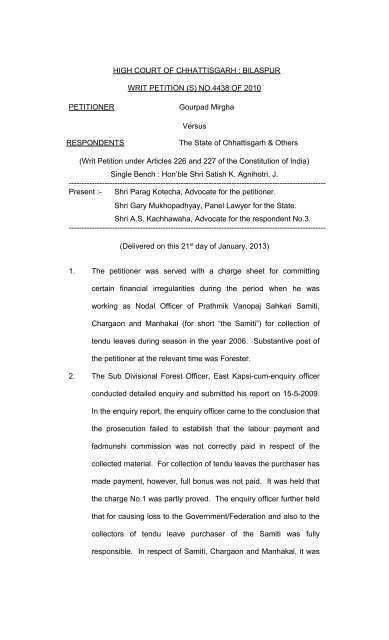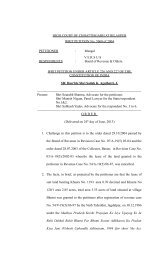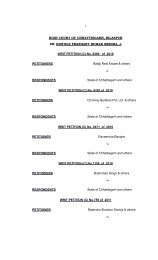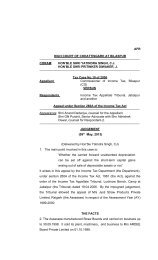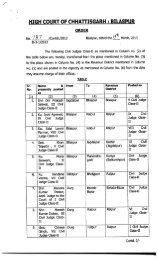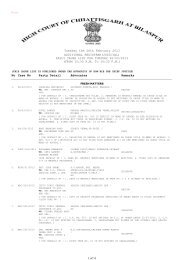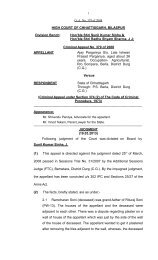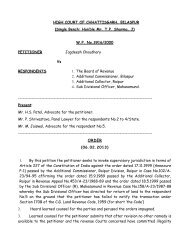HIGH COURT OF CHHATTISGARH : BILASPUR
HIGH COURT OF CHHATTISGARH : BILASPUR
HIGH COURT OF CHHATTISGARH : BILASPUR
Create successful ePaper yourself
Turn your PDF publications into a flip-book with our unique Google optimized e-Paper software.
<strong>HIGH</strong> <strong>COURT</strong> <strong>OF</strong> <strong>CHHATTISGARH</strong> : <strong>BILASPUR</strong><br />
WRIT PETITION (S) NO.4438 <strong>OF</strong> 2010<br />
PETITIONER Gourpad Mirgha<br />
Versus<br />
RESPONDENTS The State of Chhattisgarh & Others<br />
(Writ Petition under Articles 226 and 227 of the Constitution of India)<br />
Single Bench : Hon’ble Shri Satish K. Agnihotri, J.<br />
-----------------------------------------------------------------------------------------------------<br />
Present :- Shri Parag Kotecha, Advocate for the petitioner.<br />
Shri Gary Mukhopadhyay, Panel Lawyer for the State.<br />
Shri A.S. Kachhawaha, Advocate for the respondent No.3.<br />
-----------------------------------------------------------------------------------------------------<br />
(Delivered on this 21 st day of January, 2013)<br />
1. The petitioner was served with a charge sheet for committing<br />
certain financial irregularities during the period when he was<br />
working as Nodal Officer of Prathmik Vanopaj Sahkari Samiti,<br />
Chargaon and Manhakal (for short “the Samiti”) for collection of<br />
tendu leaves during season in the year 2006. Substantive post of<br />
the petitioner at the relevant time was Forester.<br />
2. The Sub Divisional Forest Officer, East Kapsi-cum-enquiry officer<br />
conducted detailed enquiry and submitted his report on 15-5-2009.<br />
In the enquiry report, the enquiry officer came to the conclusion that<br />
the prosecution failed to establish that the labour payment and<br />
fadmunshi commission was not correctly paid in respect of the<br />
collected material. For collection of tendu leaves the purchaser has<br />
made payment, however, full bonus was not paid. It was held that<br />
the charge No.1 was partly proved. The enquiry officer further held<br />
that for causing loss to the Government/Federation and also to the<br />
collectors of tendu leave purchaser of the Samiti was fully<br />
responsible. In respect of Samiti, Chargaon and Manhakal, it was
held that the purchasers have committed manipulations<br />
and financial irregularities, in collusion with the Government<br />
employees.
3. The Disciplinary Authority holding that the charge No.1 partly<br />
proved, issued a notice to the petitioner on 4-7-2009 (Annexure –<br />
P/1) calling upon him to submit his reply to the enquiry report.<br />
Thereafter, by order dated 19-8-2009 (Annexure – P/2) the<br />
Disciplinary Authority holding the petitioner responsible, ordered<br />
withholding of 5 increments without cumulative effect and also<br />
directed to recover an amount of Rs.7,17,661/- from the petitioner<br />
in 95 installments at the rate of Rs.7,500/- per month and the<br />
remaining amount of Rs.5161/-, as 96 th installment.<br />
4. Thereagainst, on 18-9-2009 (Annexure – P/3) an appeal was filed<br />
by the petitioner before the Appellate Authority in which by order<br />
dated 23-3-2010 (Annexure – P/4), the Appellate Authority reduced<br />
the punishment of withholding of 5 increments to withholding of 3<br />
increments without cumulative effect and in respect of recovery of<br />
Rs.7,17,661/- the same was affirmed. Thus, this petition.<br />
5. Shri Kotecha, learned counsel appearing for the petitioner, would<br />
submit that the petitioner is entitled to show cause notice before the<br />
Disciplinary Authority disagrees with the finding of the enquiry<br />
officer and take independent decision. Since the show cause<br />
notice was not served, the entire process is vitiated and deserves<br />
to be set aside. Shri Kotecha, placed reliance upon the decision of<br />
this Court in Ramadhar Bhaskar v. State of M.P. & Others 1 .<br />
6. On the other hand, Shri Mukhopadhyay, learned Panel Lawyer<br />
appearing for the State and Shri Kachhawaha, learned counsel<br />
appearing for the respondent No.3, while supporting the impugned<br />
orders, would submit that the Disciplinary Authority has not<br />
disagreed with the finding of the enquiry officer and on the basis of<br />
the finding wherein it was clearly recorded that the purchaser has<br />
1 2012 (3) CGLJ 62 (DB)
committed manipulation and financial irregularities in collusion with<br />
the Government employees. It was also recorded that the charge<br />
No.1 has been found proved to the extent that full bonus was not<br />
paid to the collectors of tendu leaves. Accordingly, the impugned<br />
order was passed.<br />
7. Having heard learned counsel appearing for the parties, perused<br />
the pleadings and the documents appended thereto, it is found that<br />
the enquiry officer has conducted a detailed enquiry, examined all<br />
the witnesses and documents and thereafter, came to the<br />
conclusion that in the concerned Samiti, the labour payment for<br />
collection of tendu leaves and fadmunshi commission was not<br />
properly paid, however, it was found that the bonus amount as<br />
sanctioned by the higher offices was not paid properly. It is further<br />
found that the defence i.e. the petitioner had failed to establish that<br />
he had paid the entire bonus amount, which was sanctioned by the<br />
higher offices. Thus, charge No.1 was found proved partially and at<br />
the last it was further found that the manipulation was done and<br />
loss was caused to the State/Federation in lcas of rupees by the<br />
purchaser in collusion with the Government employees. The<br />
petitioner was working as Nodal Officer/overall Incharge of the<br />
tendu leaves collection, distribution of money and also particularly<br />
distribution of bonus amount and as it was his responsibility to<br />
ensure full payment of labour charges, fadmunshi commission and<br />
bonus.<br />
8. In fact, the Disciplinary Authority has not disagreed with the enquiry<br />
report and rightly held that the charge No.1 was found partially<br />
proved. Thus, the connection of the petitioner that the Disciplinary<br />
Authority has disagreed with the enquiry report and imposed the<br />
punishment, is contrary to the facts.
9. The authorities issued a notice to the petitioner on 4-7-2009 i.e.<br />
before passing the impugned order. Reply was also filed by the<br />
petitioner on 16-7-2009 (as is evident from the order dated 19-8-<br />
2009 – page 22 of the petition), but no copy of the said reply has<br />
been annexed by the petitioner with the petition.<br />
10. There is no grievance that the enquiry is perverse or illegal and<br />
principles of natural justice was not followed. It is also not found<br />
that there was any illegality in conduct of the enquiry or the<br />
petitioner was not given full opportunity of hearing.<br />
11. On perusal of the record, it is manifest that a detailed enquiry has<br />
been conducted affording proper opportunity of hearing to the<br />
petitioner and also after examining the documents, witnesses, etc.<br />
Thus, this Court has not found any infirmity or illegality in the<br />
enquiry and in the impugned orders passed by the Disciplinary<br />
Authority as well as the Appellate Authority.<br />
12. In Dr. G.R. Uraon v. State of Chhattisgarh and Others 2 , this Court<br />
observed as under :<br />
2 2010 (3) MPHT 89 (CG)<br />
“15. It is well settled principle of law that if<br />
there is no irregularity or illegality in the decision<br />
making process and the finding is also not<br />
perverse, the High Court may not interfere with the<br />
decision taken by the employer.<br />
16. In State of Uttar Pradesh and another<br />
vs. Man Mohan Nath Sinha and another, (2009) 8<br />
SCC 310, wherein the High Court quashed the<br />
punishment order passed by the authorities, the<br />
Supreme Court held as under :<br />
14. The scope of judicial review in<br />
dealing with departmental enquiries came up<br />
for consideration before this Court in the case<br />
of State of A.P. vs. Chitra Ventaka Rao and<br />
this Court held:- (SCC pp. 562-63, paras 21<br />
and 23-24)<br />
“21. ……… The High Court is not a court of<br />
appeal under Article 226 over the decision of
the authorities holding a departmental enquiry<br />
against a public servant. The Court is<br />
concerned to determine whether the enquiry is<br />
held by an authority competent in that behalf<br />
and according to the procedure prescribed in<br />
that behalf, and whether the rules of natural<br />
justice are not violated. Second, where there is<br />
some evidence which the authority entrusted<br />
with the duty to hold the enquiry has accepted<br />
and which evidence may reasonably support<br />
the conclusion that the delinquent officer is<br />
guilty of the charge, it is not the function of the<br />
High Court to review the evidence and to arrive<br />
at an independent finding on the evidence. The<br />
High Court may interfere where the<br />
departmental authorities have held the<br />
proceedings against the delinquent in a<br />
manner inconsistent with the rules of natural<br />
justice or in violation of the statutory rules<br />
prescribing the mode of enquiry or where the<br />
authorities have disabled themselves from<br />
reaching a fair decision by some<br />
considerations extraneous to the evidence and<br />
the merits of the case or by allowing<br />
themselves to be influenced by irrelevant<br />
considerations or where the conclusion on the<br />
very face of it is so wholly arbitrary and<br />
capricious that no reasonable person could<br />
ever have arrived at that conclusion. The<br />
departmental authorities are, if the enquiry is<br />
otherwise properly held, the sole judges of<br />
facts and if there is some legal evidence on<br />
which their findings can be based, the<br />
adequacy or reliability of thatevidence is not a<br />
matter which can be permitted to be canvassed<br />
before the High Court in a proceeding for a writ<br />
under Article 226.<br />
*** *** ****<br />
23. The jurisdiction to issue a writ of certiorari<br />
under Article 226 is a supervisory jurisdiction.<br />
The Court exercises it not as an appellate<br />
court. The findings of fact reached by an<br />
inferior court or tribunal as a result of the<br />
appreciation of evidence are not reopened or<br />
questioned in writ proceedings. An error of law<br />
which is apparent on the face of the record can<br />
be corrected by a writ, but not an error of fact,<br />
however grave it may appear to be. In regard<br />
to a finding of fact recorded by a tribunal, a writ<br />
can be issued if it is shown that in recording<br />
the said finding, the tribunal had erroneously<br />
refused to admit admissible and material<br />
evidence, or had erroneously admitted<br />
inadmissible evidence which has influenced<br />
the impugned finding. Again if a finding of fact
is based on no evidence, that would be<br />
regarded as an error of law which can be<br />
corrected by a writ of certiorari. A finding of fact<br />
recorded by the Tribunal cannot be challenged<br />
on the ground that the relevant and material<br />
evidence adduced before the Tribunal is<br />
insufficient or inadequate to sustain a finding.<br />
The adequacy or sufficiency of evidence led on<br />
a point and the inference of fact to be drawn<br />
from the said finding are within the exclusive<br />
jurisdiction of the Tribunal. See Syed Yakoob<br />
vs. K.S. Radhakrishnan.<br />
24. The High Court in the present case<br />
assessed the entire evidence and came to its<br />
own conclusion. The High Court was not<br />
justified to do so. Apart from the aspect that the<br />
High Court does not correct a finding of fact on<br />
the ground that the evidence is not sufficient or<br />
adequate, the evidence in the present case<br />
which was considered by the Tribunal cannot<br />
be scanned by the High Court to justify the<br />
conclusion that there is no evidence which<br />
would justify the finding of the Tribunal that the<br />
respondent did not make the journey. The<br />
Tribunal gave reasons for its conclusions. It is<br />
not possible for the High Court to say that no<br />
reasonable person could have arrived at these<br />
conclusions. The High Court reviewed the<br />
evidence, reassessed the evidence and then<br />
rejected the evidence as no evidence. That is<br />
precisely what the High Court in exercising<br />
jurisdiction to issue a writ of certiorari should<br />
not do.”<br />
15. The legal position is well settled that<br />
the power of judicial review is not directed<br />
against the decision but is confined to the<br />
decision making process. The Court does not<br />
sit in judgment on merits of the decision. It is<br />
not open to the High Court to reappreciate and<br />
reappraise the evidence led before the Inquiry<br />
Officer and examine the findings recorded by<br />
the Inquiry Officer as a court of appeal and<br />
reach its own conclusions. In the instant case,<br />
the High Court fell into grave error in scanning<br />
the evidence as if it was a court of appeal. The<br />
approach of the High Court in consideration of<br />
the matter suffers from manifest error and, in<br />
our thoughtful consideration, the matter<br />
requires fresh consideration by the High Court<br />
in accordance with law. On this short ground,<br />
we send the matter back to the High Court.<br />
17. In Ranjit Thakur vs. Union of India and<br />
Others, (1987) 4 SCC 611, the Supreme Court<br />
observed that “judicial review generally speaking,
Gowri<br />
is not directed against a decision, but is directed<br />
against the ‘decision-making process’.”<br />
13. In Ramadhar Bhaskar (supra), the fact was different. In the said<br />
case, the Disciplinary Authority clearly recorded its disagreement<br />
with the enquiry report and passed an order. Thus, the same is not<br />
applicable to the facts of the present case.<br />
14. As a sequel, the writ petition, sans substratum, is liable to be and is<br />
hereby dismissed, leaving the parties to bear their own costs.<br />
J u d g e


